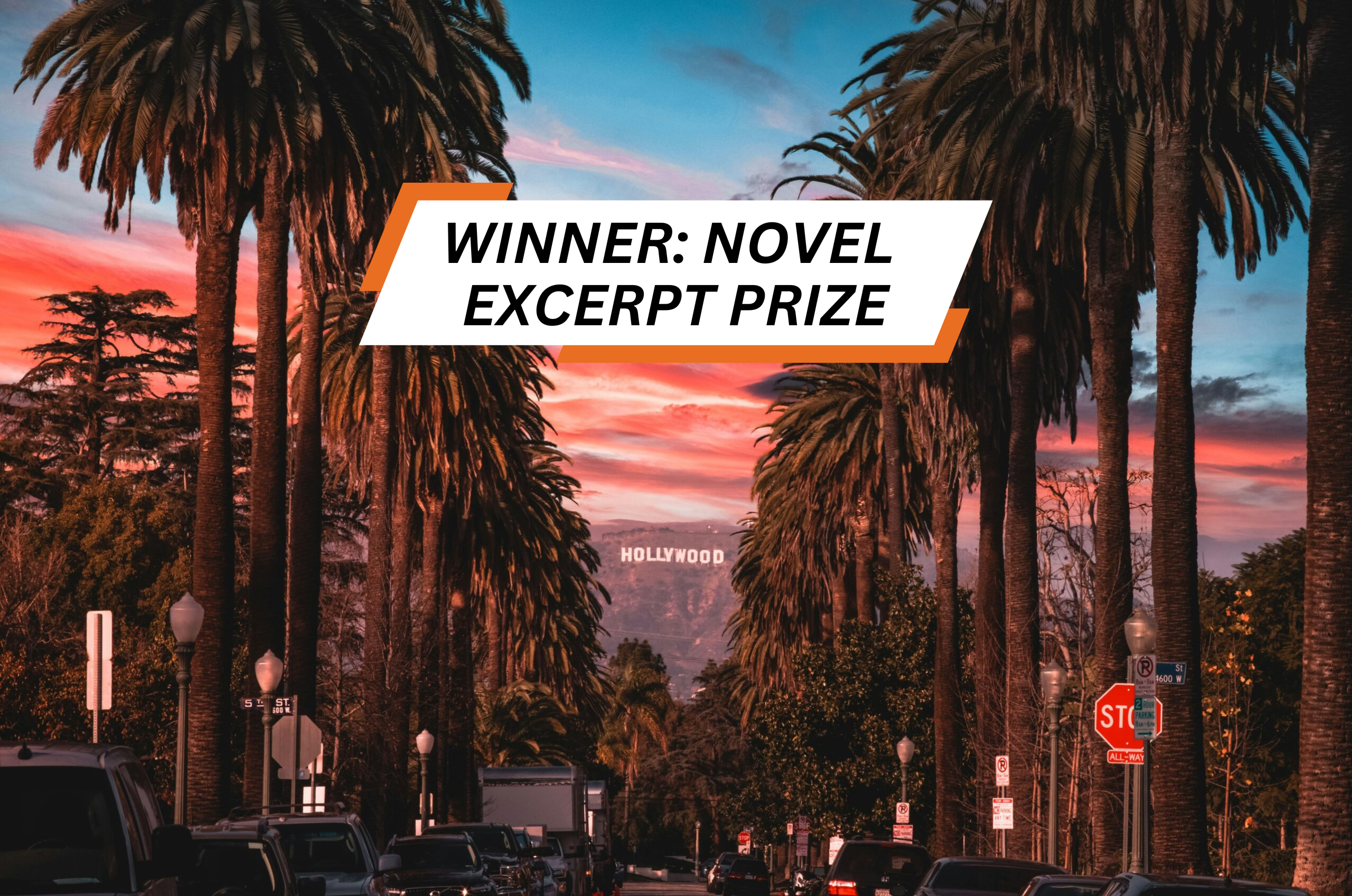Daisy wandered into MacKay’s Pub and went to the phone at the back, ignoring whatever the barman grumbled at her as he wiped down the counter. She leaned against the sticky wall and plunked her change into the slot. After a terse conversation with an early shift operator, a man picked up on the other end. Daisy had once called his voice a hacking cigar cough that happened to sound like words, and it was a testament to how little he cared about what people thought of him that he still threw her jobs after that.
“Do you know what time it is?”
“You picked up, didn’t you,” she said. “Listen, I was right about Marion Moss. I followed her all the way from the Providence Hotel to Hollywood Cemetery. She wandered around the gates like a damn vampire before the caretaker let her in.”
Something lightened in the man’s voice. “Well, now, that is worth the call. You get me the pictures before ten and we can make the morning edition before the Times or the Globe can have their gossip writers spin whatever cover story the studio cooks up.”
Daisy reached into the pocket of her coat and tapped on the little camera without saying a word. She could feel the smile falling from her editor’s face.
“You didn’t get pictures, did you?”
“Even if I did, if we print any pictures now, the studio is going to close ranks. Hold off, let me do some more digging, and I’ll get a real story for you.”
“I don’t need a real story O’Farrell. We don’t truck in real stories. We truck in interesting pictures that the legit papers won’t print. That’s your job. That’s what I pay you for.”
“But listen, she was pulling a full-on Lucy Westenra at the same cemetery where they’re burying Francine Manners today. That can’t be a coincidence. There is a story he—”
“You’re not Nellie Bly.” He let that hang for a moment. “And we’re not the New York World. Go to the funeral. Do that thing you do where you get places you shouldn’t be, snap some pictures of all the stars grieving, and I can actually give you some money. And O’Farrell, don’t get caught. It was a windfall for us when the legit papers kicked you to the curb, but I’d hate to be the one losing you.” The line went dead.
Daisy hung the phone on its cradle and went to the bar.
“Can I get a shot?”
“We’re not open yet.”
Daisy made a noise in the back of her throat. “You’re closed to tenants? Gimme a goddamn shot.”
“Your rent’s late.”
Daisy reached across the counter and grabbed one of the cheaper whiskies and a shot glass. She poured and downed it and then slid both back across the counter. Tony kept wiping down the counter but grimaced at her like he expected an apology.
“Add it to my rent.” She pushed off from the counter as she got to her feet. “I’ll have your money soon. I gotta go shoot a funeral.”
***
A cold shower in the bar’s back washroom and a change of clothes to something vaguely funeral appropriate brought Daisy to the break of dawn. As she came down the stairs from her studio over the bar, a few of the early morning regulars nodded to her over their drinks. Tony pointedly avoided eye contact with her as she crossed the room, trying to steady her gait after a night of chasing ingenues around the city.
“—she looks like death warmed over.”
Daisy stopped halfway to the door. She looked over her shoulder at a trio of studio grips sitting in a corner booth.
“And they found her at a cemetery?”
“That’s what Clara said. Digatti was pissed. She thought he was gonna shoot someone.”
“Damn,” one of the men said, shaking his head. “She’s been out of it lately. I just assumed it was drugs.”
Another of the men caught Daisy staring and quickly slapped his friend on the back of the head, directing his attention to her as well. All three of them suddenly became very interested in the bottoms of their cups. Daisy resumed her walk, making a mental note to keep an eye out for those three in the future. Loose-lipped grips meant good money.
Hollywood Forever Cemetery, the place to be…buried, looked different in the light of day. Though Daisy still felt a residual shiver run up her spine, with the sun shining and a coterie of well-dressed mourners, the place looked more melancholy than foreboding. The funeral was technically a private affair. A bulletin had been sent to all the reputable news outlets not to disturb the mourners, which made it anyone’s guess how Daisy’s boss had gotten his mitts on the memo.
The thing about funerals, though, was that nobody wanted to be the one to ask a crying woman if she was supposed to be there or not. With a black dress and a little pre-runny mascara, Daisy was able to slip into the back of the line. As she passed the twenty-year-old from the funeral home that manned the gate, she opened her handbag like she was looking for an invitation, then added a little wobble to her stance that was only half faked. He waved her right through to keep the line moving. Once inside the gates, she split off from the group and found a grave a few rows away from the action. She knelt down like she was talking to the stiff and fished her camera out of her handbag.
A gathering of famous faces like this was usually accompanied by velvet ropes and flashbulbs. She saw Cindy Wood, the perennial damsel in distress and little Carl Peters, the heroine’s precocious kid brother in any number of romances. Judging by the line of acne barely concealed under a subpar makeup job, he was not long for those roles. Mickey McGuire, the dashing mustachioed swashbuckler, walked at the head of the precession. Marion Moss hung, almost literally, off his arm. The careless grips had been right. She had a better makeup job than Peters, but even from a distance, it was clear that she was in a bad way. Under other circumstances, Daisy might have chalked that up to being at a funeral, but after what she had seen the night before, she was not so certain. Anton Wolf, best bogeyman bar none, walked slightly behind them—a vampire in the cemetery, a shot of that had to be worth at least a few bucks for serendipity alone.
Daisy went for quantity over quality since she could not afford to line up her shots properly. One of them had to be good enough for the early edition. She snapped one as Mickey McGuire walked Marion Moss to the head of the congregation. Moss said a few words and stepped back.
More speakers followed, but Daisy was too far away to hear any of them. She thought she understood the gist. She had been to enough funerals in her life. The stars all looked genuinely saddened, and she noticed for the first time how many unfamiliar faces were in the crowd. It occurred to her that the press had not been allowed in because this was the rare Hollywood event that was not meant for publicity. A small part of her felt guilty for showing up—not enough to throw out the pictures, but enough for her Catholic upbringing to kick in. She decided that she had enough. She got up, made the sign of the cross, and thanked Otto Culpepper for giving her cover. Now standing, she had a better look at the back end of the mourning party.
A man in coveralls, the same caretaker from last night, crossed behind them with his wheelbarrow. As he passed, he and Marion Moss locked eyes, almost imperceptibly, for just a second, but it happened. For Daisy, it was a confirmation that the previous night’s events had really happened. Marion Moss and this random ditch digger knew each other. He had seen what Daisy had seen, and maybe if she could grease his palm, she could—
A man shaped like an oil drum, wringing his hat in his massive mitts, stepped in front of the caretaker. With his back to Daisy, he nearly blocked the caretaker from view, but Daisy saw the sudden terror on the caretaker’s face. She did not wait to see what happened next. She made for the gates, forgoing stealth entirely and walking as fast as she could as her vision got cloudy at the edges and her legs turned into rubber hoses, all the while the image of those mitts around her throat flashing through her skull.
The next thing she knew, she was at the trolley stop, and her heart was hammering so loud that she thought it might burst out of her chest. She gripped a lamppost and felt the hot, sunbaked metal searing her bare hand. The pain brought her back to the present moment. A trolley bell rang as it pulled up.
She lit up a cigarette and smoked all the way back to MacKay’s, knocking out half a pack by the time she disembarked. She hurried in, cracking the film roll out of her camera and tossing it to Tony, who caught it off hand as he poured drinks behind the counter.
“Can you develop those for me? I gotta go change and then get to the Inkwell.”
Tony closed his hand around the film roll and glared at her as she went up the stairs.”
“I’m not your damn secretary. And you can’t afford the Inkwell,” he shouted, spooking several drunks, though the regulars paid him no mind. “That’s why you live here.”
A plan had taken shape about halfway through the second smoke. Up in her cramped room, Daisy fished out a different, less somber dress, and a long coat to wear over it. She had saved up for this outfit. It was long term investment, at least that was what she told Tony when he asked her why she had wasted good rent money on it. She let the black funeral dress hit the floor and slipped into the sequined dress that the cigarette girls at the Inkwell Tavern wore. She put the coat over it and cinched it tight so nobody on the trolley would give her weird looks. It was not so much that crazy outfits attracted attention on public transit. This was Hollywood, after all. It was more that she had put a lot of effort into this disguise, and on the off chance anyone recognized her, it would be money down the drain—money she did not have. She went out the back way and hopped a streetcar to the Inkwell.
The buzz of excitement that she had felt upon seeing Marion Moss outside of that cemetery last night and the prospect of discovery that it represented, had kept her awake so far, but as she disembarked the streetcar, she felt fatigue creeping up on her. She rolled her shoulders and marched up to the Inkwell with purpose, reasoning that she could not collapse from exhaustion if she simply refused to acknowledge she was tired.
There was no signage marking the memorial for Francine Manners, but there was a thug in an ill-fitting suit standing by the front door, eyes fixed on every passerby. Daisy ducked into the alleyway beside the club, where the scent of tobacco and cheap spirits was strong. A couple of cigarette girls and a waiter hung by the side entrance, smoking and passing a flask around. Daisy fished a couple of dollars out of the pocket of her coat—the last of her cash, and flashed it subtly at the congregation.
The shorter of the cigarette girls, a tiny thing with a head of blonde ringlets, stepped up to her and took the money. She held her arm out, and Daisy shrugged out of the coat and handed it to her.
“You got fifteen minutes,” she said.
Daisy smiled, though it was not returned. “Thanks, Molly.”
The waiter held the door for her, and Daisy entered the back storeroom of the Inkwell Tavern. She grabbed a cigarette tray from a rolling cart and pushed through the kitchen, keeping her head down as she made her way to the main lounge.
She had seen the Inkwell in full swing before. There was a main stage where a band played and the owner’s girlfriend sang. Beautiful people clinked glasses and smoked and sang along. She would have thought that the glamour was wasted without the press there to document it, but today, the atmosphere was markedly different.
It was the same collection of faces she had seen at the cemetery, and they had broken off into small groups where they muttered in hushed tones. The piano tinkled in the corner, but even that seemed muted to match the conversation. The owner, Ozzy, sat at the bench, playing something sad and Irish, while Mickey McGuire sat slumped in a chair beside him, singing along softly.
“…and since it falls into my lot that I should rise and you should not…”
It struck Daisy suddenly how very average the scene was. She must have been to a dozen wakes like this and so had the readers she was looking to take photographs for. Every one of them had a grand impression of what the funeral of a glamourous actress must look like but it was just a lot of sad people drunkenly singing the old mourning songs.
“…I gently rise and softly call good night, and joy be with you all…”
Still, she had bills to pay, so she hid her camera in between the packs of cigarettes and snapped a few pictures as she made a circuit around the room. The one thing that struck her was that there was no sign of Marion Moss. She thought that a good picture of the ingenue of Pirate King of the Bayou slumped over a gin and tonic, mourning her friend, would make a nice companion to the shots of her looking ready to keel over at the memorial, but she was nowhere to be found.
Daisy was just passing the restrooms when the door to the kitchen opened, and the oil drum-shaped man stepped out, cleaning his teeth with a wooden pick. Daisy moved like a frightened jackrabbit, flying through the swinging door to the women’s bathroom and not taking a breath until it swung closed behind her. Her heart hammered, intent on escaping with or without the rest of her body. She was so focused on her own panic that it took her far longer than it should have to notice the other woman standing at the sink, staring at herself in the mirror.
“Um, cigarette?” Daisy said.
Marion Moss turned to face her and blinked very slowly. She looked dreadful—no, that was unfair. She was the number one female box office draw for a reason. She never looked dreadful, but she certainly looked rough. She reminded Daisy of older women at wakes for their husbands, people who looked less alive than the bodies on display. Daisy thought that if she took her up on that offer of a cigarette, she would be able to see the fire glowing right through her flesh.
“No…well…maybe.” Some of the blank shock on her face turned into genuine confusion. “Is this a new service here? Washroom attendant cigarette girls?”
“I uh…” Daisy thought furiously about a good lie, but all she could think about was the barrel-shaped man on the other side of the door. “I had to…relieve myself. But…while I’m here, could you use a smoke?”
There was an open compact mirror resting on the edge of the sink. Daisy thought Moss must have been touching up her makeup when she came in—except she had been standing perfectly still, just staring at herself in the mirror like she was in a trance.
“Um, no, thank you. But maybe when you’re done, I could use a drink.”
Daisy did not know why she said it, but before good sense could stop her, she blurted out, “I’m sorry about your friend. I mean…I guess we all sort of assume you all know each other. Anyway, I’m sorry.” She reached into the cigarette tray where, just behind the camera, she had stowed a small flask of cheap whiskey. She offered it to the starlet standing across from her. “Little, pick me up before you rejoin the others?”
The corners of Moss’ mouth twitched into something like a smile and she took the flask. She took a longer pull than Daisy had anticipated, which, to her mind, just proved how rough the whole situation was. She handed back the flask and wiped her lips with the back of her other hand, smearing her makeup slightly.
“Thank you.” She started for the door.
Daisy looked down at her camera and then up at Moss.
“Wait.” She gestured to her own lips.
Moss checked herself in the mirror and quickly went back to the sink to touch up.
“Thanks,” she said, still looking at her reflection. “God, if the press had seen me like this…”
“There’s no press here.”
“You never know,” Moss said. “Francine…was…she was always camera ready. Even coming out of her suite to get the paper. She acted like every corner was hiding some bum with a camera, and she never wanted to be caught off guard. She wasn’t vain, you know, just…she knew what this job meant. We’re not people to everyone else you know, we’re characters. Characters only get to have the flaws the writers want them to have.” She sighed as they finished touching up her face. “Or else the story doesn’t make sense.”
Daisy was acutely aware that at any moment Moss might see her camera, but if she ducked out now and ran straight into the barrel-shaped man, she was as good as dead. She stayed put, staring at this woman who seemed to be talking more to herself than Daisy anyway.
“Doesn’t sound too fun.”
Moss shrugged. “Making movies is fun. The rest of it…well, what am I boring you with all of this for. I’ll leave you to your business.” She went to the door, but stopped and looked over her shoulder at the last minute. “Thanks for the drink—um, don’t tell the papers any of what I said, okay? The studio doesn’t like it when stuff like that gets out and…well, they can get pretty mean.”
“Fans must get you into a lot of trouble, huh?”
“Everyone gets in trouble when the story doesn’t get told right,” she said.
Then she was gone, and Daisy was alone in the women’s washroom of the Inkwell Tavern, dressed like a cigarette girl and holding a camera full of sad photos. She waited another minute to make her cover story believable and then ducked out of the washroom and made a beeline through the kitchen and back out into the alley.
She passed the cigarette tray back to her contact and retrieved her coat, pulling it tight around her body as she walked out of the alley. She had a brief moment to think that her foray into high society had gone as well as it could have when a shadow fell across her path. She looked up and got a face full of acrid smoke.
“Isn’t a sin to crash a funeral?”
Daisy held steady, but she could feel every part of her body threatening to give way. Digatti puffed on his cigar, barrel chest rising and falling. He stood close—not close enough to alert any passersby, but enough to let Daisy know that he was serious.
“I’m not crashing anything. I need money. Ozzy throws me a shift every now and then.”
Digatti shook his head. “You’re smarter than that, aren’t you? I remember you telling much better lies.” He held out his hand, palm up.
Daisy cracked open her camera and dumped the roll of film into his waiting palm. He closed his fist around it, and there was an audible crinkling sound. Daisy winced. None of the pictures had been all that good, but she had still gone to the trouble of getting them.
“Can I go now?”
Digatti grabbed her wrist as she tried to pull away. He squeezed, and she almost let go of the camera. His fingers were rough and calloused, and she saw scars on his knuckles, the kind that a person gets from cutting themselves on someone else’s bones.
“I was kind last time.” He squeezed her wrist harder. “There is no story here, especially not for you. Those people in there—they are kenneled. They are not show-ready. Nobody would buy the pictures anyway, but making sure you don’t take them is a matter of discipline. Now, is it really Ozzy that let you in here?”
Daisy felt like her wrist was going to pop right off. She ground her teeth to keep the pain away long enough to speak.
“Yeah. Yeah, it was Ozzy.”
The pressure let up slightly, but he still had her in a vice.
“I thought that dumb Irishman and I had an understanding. Fine. I’ll talk to Ozzy.” He let go of her wrist. “You can go. I recommend you go far. I hear Mexico is nice.”
He walked away, back towards the front entrance of the club. Daisy started walking, moving right past the street car that had just pulled up. She needed to move, needed to make her body work. If she sat down, she might never get up, so she walked until she made it all the way back to the McKay’s. She went inside, ignoring the drunks all around her, moving past the counter and towards the stairs at the back like a spirit making its rounds through a cemetery.
“Daisy.” The sounds of the bar went into sudden relief.
Daisy stopped, still shaking, and turned to face Tony. He stood behind the bar, his regular scowl melting slightly as he saw her pale face. Without taking his eyes off her, he reached under the counter and pulled out the expensive scotch that he had kept well away from the prying eyes of the local drunks. He filled a shot glass and set it on the counter. Daisy shuffled forward and sat down mechanically. She downed the shot, and Tony poured another without asking.
“Sláinte,” Daisy said as she downed the second shot.
“You hurt?”
Daisy poured herself another shot, drank it, then shook her head.
“Just shaken.”
Tony cocked his head at her wrist. She noticed and hastily tugged at her sleeve to cover the bruise.
“Rough wake, eh?”
Daisy gave a mirthless chuckle. “Gatecrashing a funeral. Obviously, a bad idea.”
“Did you at least get your pictures?” Tony watched Daisy’s shoulders slump. “Ah,” he nodded and poured her another drink. “It was him, wasn’t it? Digatti?”
“Yeah.” Daisy was shocked at the smallness of her own voice. She could not remember the last time she had spoken that softly, but then she looked up at Tony, and suddenly she could remember all too vividly.
“Bastard.” Tony reached under the bar and pulled out a large envelope. He set it down next to Daisy’s drink. “I was gonna send these to your editor myself—get your damn rent money—but I figured you’d want to see them first.”
Daisy dumped the photos out of the envelope and spread them out across the bar. One or two of the regulars stopped and looked over her shoulder on the way out of the men’s room before shrugging and moving on to their seats. She was almost proud of herself for the quality of the pictures. Nobody would be handing out any awards, but for covert pictures taken with a cheap and tiny camera from behind a headstone, the framing and composition were good. The tabloid might even pay her a little extra, especially considering they were the only ones of their kind. She could invest in the shotgun and padlock she would need when Digatti realized who had taken them.
Shuffling through the sheets, something caught her eye. She held the photo up to the light and then gave Tony a narrow-eyed stare.
“What did you do to this one?”
Tony, face unmoved, took the photo from her hands, looked it over, and then put it right back between her fingers.
“Came out like that. Figured it was a problem with your cheap ass camera.”
It was the best-framed shot she had gotten, with Marion Moss and the casket right in the center frame and a good look at her haggard face. Daisy noticed how much her expression in the photo matched her expression in the washroom at the Inkwell. She pried her eyes away from Moss’ face and focused on the markings around her. It looked like the opposite of when she overexposed the film. There was a corona of shadow around Moss, clinging to her. The harder Daisy stared at it, the more she thought it looked like something physical, something that had been there in the frame instead of a problem with the film. She shuffled through the rest of the photos, looking for any other sign of it.
It was on every single one—clinging to Moss like a mink wrap.
Daisy slid her chair back from the counter. She tensed up like she might fall apart if not for a pure effort of will. Tony looked at her with some concern, and then down at the pictures. He scooped them up and put them back into their envelope.
“You want I should send these in?”
Daisy ran her hand through her hair, making strands stick out at odd angles.
“I need to talk to that groundskeeper.”
Tony blinked. “What?”
“The groundskeeper at the cemetery.” She stood up. “Something’s going on here, something to do with Moss and Digatti. I’m close. I can feel it.” Something like a smile passed across her face. “Just like old times.” She took two steps to the door and stumbled over her own feet. Two regulars moved from their chairs with a speed they had not demonstrated since The Great War and caught her before she cracked her head on the floor. They carried her back to her stool and helped her into it.
Tony rested his hands on the bar and looked her up and down.
“You need sleep, Daisy.”
“I need to talk to the groundskeeper.”
Tony grumbled in the back of his throat. “He’s a cemetery groundskeeper. He’s not going anywhere.”
“I need—”
“Sleep. Now.” Tony crossed his arms. A couple of the drunks half got out of their chairs before they realized he was talking to Daisy.
When she did not move, Tony came out from around the bar and gently took her under his arm. He helped her to her feet and guided her up the stairs, catching her when she stumbled. He set her down on her bed, pulled her threadbare blanket over her, and left, turning out the lights as he went. Daisy was asleep in minutes.
***
She decided that she would never admit to Tony how good she felt after a night of sleep. It would make him think she respected his opinion. She washed and dressed and then came down into the bar where the early birds were already in their cups. Tony was sitting at a barstool on the wrong side of the counter; a newspaper spread out in front of him. In the three years she had lived above his bar, she had never seen him read the paper in the morning. The early morning drunks all looked more morose than usual, and there were a few faces among them that usually didn’t show up until the shoots on the backlots broke for lunch.
Daisy fished herself a handful of bar nuts from the stash behind the counter and plopped down two stools from Tony.
“Who died while I was asleep?” She said while casually popping cashews into her mouth.
Tony lowered the paper from his face. He looked like Daisy’s mother had when she had to break the news about her lost cat. He could barely bring himself to meet her eyes.
“Marion Moss.”
Daisy dropped her handful of nuts and snatched the paper out of his hands. She scanned over the article, crinkling and tearing the edges of the broadsheet as she flipped between pages until she had taken in every bit of news the Globe had on the event. There were quotes from fans and colleagues, an official statement from the studio, and an obituary that had clearly been a rushed job, but the only part that stuck with her was Marion Moss died last night of undisclosed causes in her room at the Providence Hotel. Sources report she was alone at the time. Daisy laid the mangled broadsheet on the counter and stared hard at nothing.




